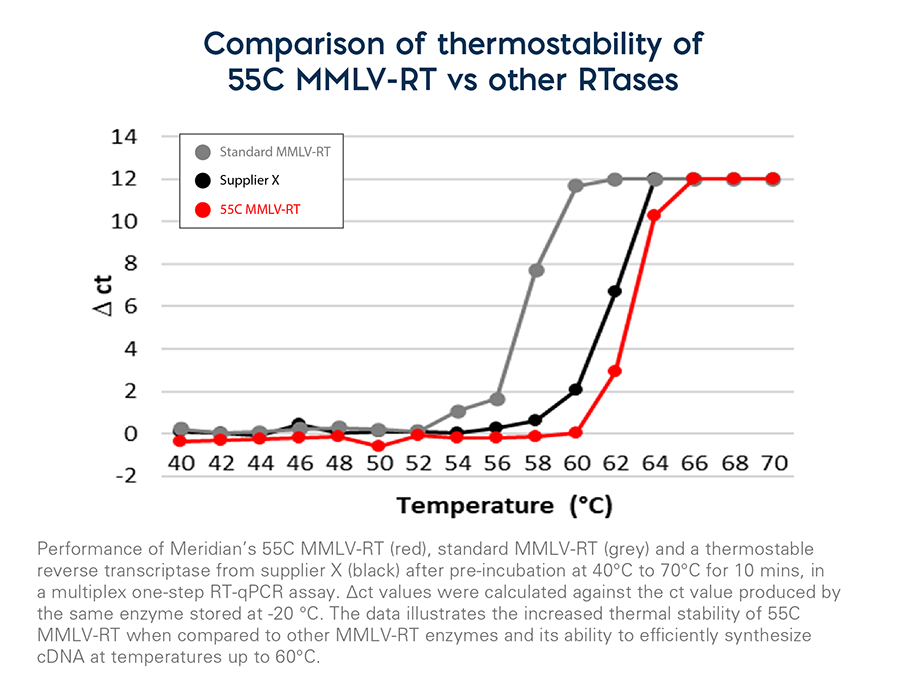55C MMLV-RT
Meridian’s 55C MMLV-RT is a highly robust, thermostable reverse transcriptase, ideal for cDNA synthesis from RNA with a high secondary structure such as viral RNA genomes.
Have questions about a product?
Contact us to learn more about Meridian’s molecular or immunoassay reagent portfolio. We want to hear from you!

55C MMLV-RT, MDX117
Highly robust, thermostable reverse transcriptase, ideal for cDNA synthesis from RNA with a high secondary structure such as viral RNA genomes.
Documents & Resources
Description
Traditional Moloney Murine Leukemia Virus Reverse Transcriptase (MMLV-RT) is not thermostable and can only maintain its enzymatic activity at relatively low temperatures (up to 50°C). However, for cDNA synthesis, a higher reaction temperature is sometimes desirable as it reduces RNA secondary structures which can inhibit reverse transcription and it minimizes nonspecific primer binding. 55C MMLV-RT is a highly thermostable reverse transcriptase with reduced RNase H activity, that allows very efficient first-strand cDNA synthesis at temperatures up to 60°C. This improves the cDNA yield from difficult RNA targets, such as viral RNA genomes, that require higher temperature to denature strong RNA secondary structure.
Specifications
| Description | Developed to reduce RNase H activity and increase thermal stability, 55C MMLV-RT can be used at temperature up to 60°C, enabling melting of areas of secondary structure in RNA, improving cDNA yield and sensitivity from difficult RNA targets such viral genomes. |
| Concentration | ≥ 200 U/µL |
| Specific Activity | ≥ 300,000 U/mg |
| Purity | > 95% (densitometric analysis of SDS-Page) |
| Appearance | Clear, colorless solution |
| Application | cDNA synthesis, RT-PCR, PCR, two-step RT-qPCR, one-step RT-qPCR |
| Sample type | RNA |
| Presentation | 1 vial |
| Storage | -20 °C |
| Mix stability | See outer label |
| DNA contamination | None detected in PCR amplification with traces overlay with the negative control on E. coli and mouse genomic DNA specific targets. |
| DNase/RNase Contamination | No detectable degradation |
Catalogs & Brochures
55C MMLV-RT55C MMLV-RT
A Comprehensive Guide to Essential Reagents for High-Throughput Molecular Diagnostic Assays (MDx)Accelerating Efficiency: A Comprehensive Guide to Essential Reagents for High-Throughput Molecular Diagnostic Assays (MDx)
FAQs: 55C MMLV-RT
Yes, for RNA with very high secondary structure we recommend using 55C MMLV-RT, this thermostable reverse transcriptase can be used at temperatures up to 60°C which improves the cDNA yield from difficult RNA targets (such as viral RNA) that require higher temperature to denature strong RNA secondary structures.
55C MMLV-RT does contain the domain for RNase H, but it has been inactivated, so that there is no detectable RNase H activity.
If you are going to do RT-PCR or RT-qPCR, this is unnecessary, RNA:DNA duplex after cDNA synthesis are melted during the 95°C denaturing step at the start of the PCR reaction. For cloning of larger fragments, RNase H treatment can be beneficial.
The reverse transcriptase can be inactivated by adding a chelating agent such as EDTA or heating to 70°C or higher for 10 min.
55C MMLV can be used for first-strand cDNA synthesis at temperatures up to 60°C, providing increased specificity, higher yields and can generate cDNA up to 12 kb.
Yes, to initiate reverse transcription, the MMLV-RT reverse transcriptase require a primer to bind to its complementary sequences on the RNA template and serve as a starting point for synthesis of a new strand. For general cDNA synthesis, random hexamer primers and oligo(dT) primers can be used either separately or mixed. For RT-PCR and RT-qPCR gene-specific primers should be used.
55C MMLV-based reverse transcriptase has an error rate in the range of about 4.8 × 10−5.
Get In Touch With A Specialist
Have questions about a product? Want to learn more about Meridian’s molecular or immunoassay reagent portfolio? We want to hear from you!